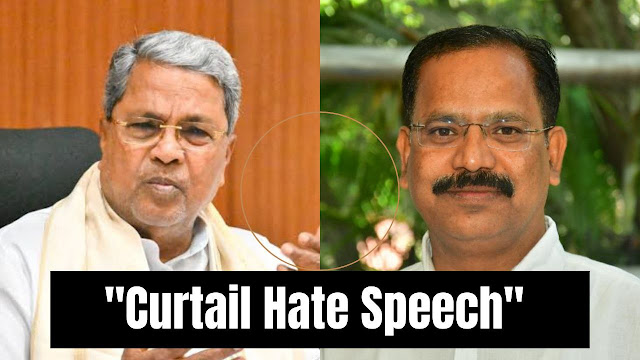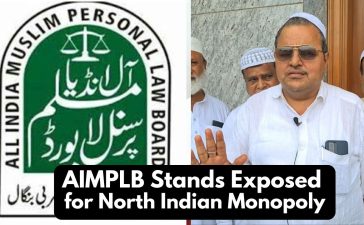“Hate speech isn’t free speech—it’s a weapon that divides societies. This bill is a shield against it.”
Bengaluru: The Karnataka government is set to introduce a Hate Speech Prevention Bill aimed at curbing divisive rhetoric based on caste, religion, language, and region. This initiative has been widely welcomed as a necessary step to safeguard communal harmony and prevent inflammatory speeches that disrupt social peace.
Prominent activist and scholar Dr. Razak Ustad has emphasized the urgency of strict enforcement against hate speech. He has called for immediate arrests of individuals engaging in such rhetoric, without waiting for a formal complaint. “Any person, organization, or party, irrespective of their religion, that delivers hate speech should be arrested on the spot without delay. The police should act spontaneously and not wait for complaints to be filed,” he asserted.
A Growing Concern: The Rise of Hate Speech
In recent years, there has been a concerning rise in hate speech, with certain individuals gaining prominence through inflammatory remarks. Political and social events across Karnataka have provided platforms for divisive rhetoric, emboldening young individuals to mimic such speech. While the Indian Penal Code already contains provisions against hate speech, challenges in enforcement have made implementation difficult.
The Supreme Court has previously directed all state governments to take suo motu action against hate speech perpetrators. However, local police, often influenced by political pressures, have been reluctant to act decisively. Dr. Ustad pointed out the disparity in law enforcement, stating, “While action is sometimes taken against smaller speakers, influential figures continue to make incendiary remarks without consequence. This raises serious questions about the impartiality of the law.”
Instances of Hate Speech and Lack of Action
Several right-wing leaders and BJP members, including Basanagouda Patil Yatnal, C.T. Ravi, N. Ravikumar, Pratap Simha, and Harish Poonja, have repeatedly made provocative statements targeting religious minorities. Despite these speeches sparking communal tensions, legal action against them has been inconsistent.
A notable instance occurred in Shivamogga, where riots led to the tragic death of a youth. BJP leader K.S. Eshwarappa’s rally in a Muslim-majority area further escalated tensions. Another case involved Kalladka Prabhakar Bhatt, who allegedly made derogatory remarks about Muslim women during an event in Mandya district. Despite Supreme Court directives, police failed to register a suo motu complaint against him.
In contrast, a rare instance of action was taken when Pratap Simha made inflammatory remarks in Shahapur, Yadgir district. The police registered a case against him, but it remains an exception rather than the norm.
The Need for a Stronger Law
Critics have questioned the necessity of a new law when existing provisions already address hate speech. However, experts argue that additional measures are needed for effective enforcement. Just as specialized anti-terror laws like TADA, KOCA, MOCA, and UAPA were introduced despite existing penal codes, a dedicated law against hate speech is essential to curb its rising influence.
The proposed bill could introduce strict penalties, including the denial of bail for at least three months for offenders. Dr. Ustad also suggested making law enforcement authorities, including the police, tehsildars, and district magistrates, accountable for preventing hate speech at public events.
Preventive Measures and Accountability
Proactive measures are crucial to addressing hate speech before it incites violence. Dr. Ustad stressed that organizers of events should also be held accountable if they invite individuals known for making incendiary remarks. Furthermore, authorities should have the power to cancel events in advance if there is credible intelligence that hate speech will be delivered.
“As prevention is better than cure, law enforcement agencies must take responsibility in advance to stop hate speech. If a person flees after delivering a speech, immediate action should be taken against officials who failed to act,” he urged.
A Collective Effort for a Peaceful Society
At a time when divisive rhetoric threatens social cohesion, Karnataka’s initiative to introduce a Hate Speech Prevention Bill is a crucial move. Ensuring strict and unbiased enforcement of this law will be key to maintaining the state’s legacy of communal harmony.
“The garden of peace must be protected,” said Dr. Ustad. “If Karnataka wishes to uphold justice and unity, it must implement this law effectively, ensuring no one is above the law.”
With growing public awareness and legal action, Karnataka stands at a turning point in its commitment to curbing hate speech and fostering a more inclusive society.
Quotes & Statements:
✅ “Hate speech isn’t free speech—it’s a weapon that divides societies. This bill is a shield against it.”
✅ “Justice delayed is justice denied. Suo motu action against hate speech must be the norm, not the exception.”
✅ “A society that tolerates hate speech risks sacrificing its peace and unity. Strong laws are essential.”
✅ “If prevention is better than cure, then proactive action against hate speech is the only way forward.”
✅ “The garden of peace must be protected. Let’s build a Karnataka where voices unite, not divide.”
![]()









